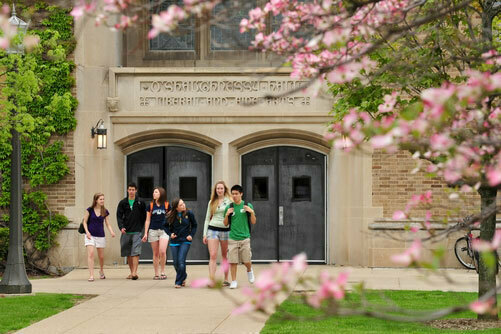

The University of Notre Dame’s College of Arts and Letters has launched a new, guaranteed postdoctoral fellowship that will incentivize timely dissertation completion and prepare graduate students to launch their careers.
Funded in part by a three-year, $1.5 million grant from the Andrew W. Mellon Foundation, the 5+1 Postdoctoral Fellowship Program guarantees that students who finish their dissertations and complete degree requirements within five years of enrollment will receive a one-year postdoctoral fellowship.
This fully funded transitional year will provide an ideal opportunity for new doctorate recipients to prepare for an increasingly competitive job market by furthering their research, expanding their teaching portfolio, or exploring career opportunities outside the academy.
“Our new program sets Notre Dame apart for its dedication to reducing time to degree and ensuring that our doctorate recipients are well positioned for postdoctoral success,” said John T. McGreevy, the I.A. O’Shaughnessy Dean of the College of Arts and Letters. “This opportunity serves as a generous reward for students in all of our programs who achieve this goal. It is not a competition—it is a commitment.”
The Mellon Foundation grant continues its long tradition of supporting innovative work in graduate education in the arts and humanities.
“Notre Dame’s commitment to improving the structure and capacity of graduate education with its creative 5+1 initiative responds to challenges facing doctoral education through curricular restructuring, a postdoctoral fellowship, and support for expanded career opportunities,” said Cristle Collins Judd, senior program officer for the Mellon Foundation. “This initiative offers an important model as part of a national conversation of how best to structure and support graduate education in the humanities.”
Beginning in fall 2016, Arts and Letters doctoral students will receive:
• A base stipend annually for five years (paid over 12 months, reducing or even preventing the need for summer work)
• $1,500 in a professional development account to be used for fieldwork, conferences, travel, and other research expenses (for students entering in 2015 or later)
• Streamlined curricula designed to facilitate doctorate completion within five years, pushing many professionalization activities back to the sixth year
Upon completing their dissertations within five years of enrollment, doctorate recipients will earn:
• An additional year of funding at a level higher than their previous stipend
• Professional assessment, training, and guidance through a new multi-stage career advising program (currently in development)
• An additional $1,500 in professional development funds
• The option to spend the full year teaching one course per semester, preparing to publish work and presenting at conferences, or working in a professional position within the University
Professional placements open to postdoctoral fellows will include digital humanities internships, library internships, editorial assistant positions at the University press and academic journals housed at the University, internships with the University development office or placements with scholarly organizations based on campus.
This year’s first class of 5+1 postdoctoral fellows will take up placements at the University of Notre Dame Press, University Relations, the Rome Global Gateway and a teaching exchange at the University of Heidelberg’s Department of American Studies.
Additional placement opportunities will possibly extend to off-campus museums, libraries, foundations or arts and humanities organizations.
The postdoctoral period will enable students to spend their final graduate school years focused on their crowning educational achievement—the dissertation. Then, once it is complete, they can devote the next year to professional experiences that will enhance the competitiveness of their applications to jobs both inside and outside the academy.
“Students who earn a doctorate in the humanities or the social sciences develop a wide range of skills that are applicable to many careers beyond the professoriate,” said Margaret Meserve, associate dean for the humanities. “Unlike traditional programs that only offer academic placements, our new program is intended to expand the range of experiences available to our graduates.”
Arts and Letters doctoral programs are also committed to shortening doctoral students’ time to degree, ensuring the five-year dissertation goal is attainable by reviewing and revising their programs.
In the Department of History, for example, students now complete their coursework by the end of the second year. The comprehensive exam sequence has also been reduced from four exams to three, and the third exam is now directly tied to the student’s dissertation topic. As a result, students can begin working on their dissertation months—or even a full year—earlier than before.
Jon T. Coleman, professor and director of graduate studies in the Department of History, said the program provides an essential incentive for both students and departments to ensure a doctorate is completed in the funding window provided.
“The fellowship year offers students the chance to reflect on the doctorate journey and re-imagine the course forward,” Coleman said. “I hope it will become the most creative and life-changing year in a person’s graduate career.”
The College of Arts and Letters plans to share the results of its new initiative with graduate programs at peer institutions across the country. Notre Dame will serve as a convener of conversations about graduate education, curricular development, professionalization and new models of postdoctoral support.
“We’re proud of the training our students receive in our humanities doctoral programs,” McGreevy said. “And we’re grateful that the Mellon Foundation shares our goal of encouraging students to move through these programs in an expeditious manner and widening the range of opportunities available to them after graduation.”
Originally published by Josh Weinhold at news.nd.edu on July 13, 2016.